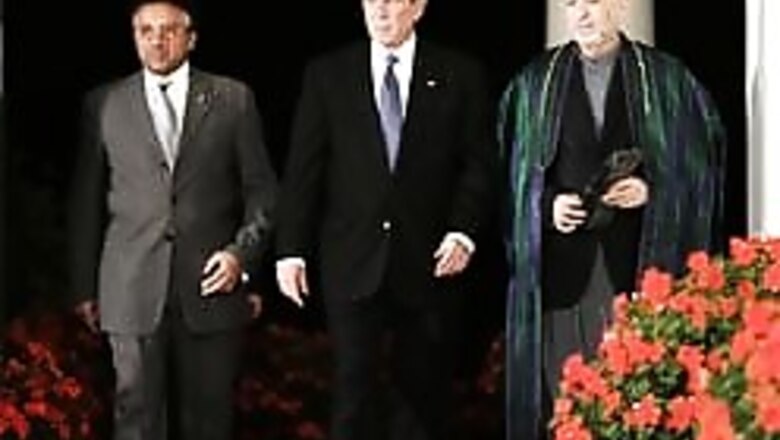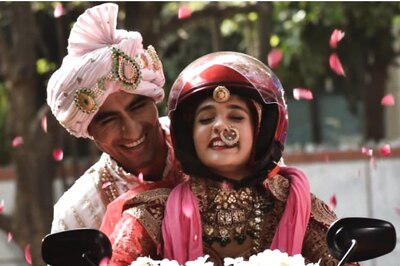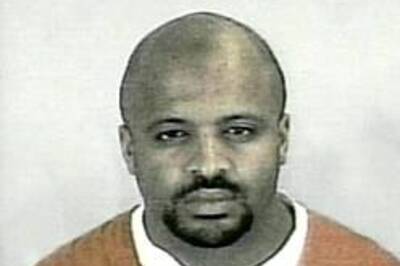
views
Washington: US President George W Bush appealed to the bickering presidents of Pakistan and Afghanistan to put aside their differences and ''strategise together'' over dinner on ways to defeat the common enemy of terrorism.
Standing between Pakistani President Gen Pervez Musharraf and Afghan President Hamid Karzai on Wednesday, Bush emphasised ''the need to cooperate, to make sure that people have got a hopeful future'' in both countries.
Judging by the body language Bush himself had said he would be watching, there were plenty of tensions to overcome over a light dinner of soup, sea bass and salad. The meal was billed as an 'iftar', a meal that breaks the daytime fast during the Muslim holy month of Ramadan. Musharraf and Karzai are Muslims.
The Afghan and Pakistani leaders stood stiffly on either side of Bush during a brief Rose Garden appearance before they ate. The pair, key US allies in a volatile region, shook hands with Bush, but not with each other.
''Today's dinner is a chance for us to strategise together'' and find common solutions, Bush said.
Musharraf remained expressionless during his host's brief remarks, while Karzai repeatedly nodded agreeably.
''These two men are personal friends of mine,'' Bush said. ''They are strong leaders who have an understanding of the world in which we live. They understand that the forces of moderation are being challenged by extremists and radicals.''
After the meal, the White House issued a statement that called the session a ''constructive exchange'' but outlined no new agreements or initiatives. The White House did not make any officials available for questions.
''They committed to supporting moderation and defeating extremism through greater intelligence sharing, coordinated action against terrorists and common efforts to enhance the prosperity of the people of Afghanistan and Pakistan,'' said the statement from press secretary Tony Snow said.
For months, Karzai and Musharraf have been trading barbs and criticizing each other's efforts to fight terrorists along their long, remote, mountainous border.
Afghan officials allege that Pakistan lets Taliban militants hide out and launch attacks into Afghanistan. Musharraf says Karzai has bad information and notes that Pakistan has deployed 80,000 troops along the porous border.
PAGE_BREAK
Karzai says Musharraf turns a blind eye to hatred and extremism being bred at Islamic schools in Pakistan. At one point, Musharraf said Karzai is behaving ''like an ostrich,'' refusing to acknowledge the truth and trying to shore up his political standing at home.
Right up to Wednesday night's White House dinner, they also have pointed fingers at one another over al-Qaida leader Osama bin Laden and other terror leaders. Each says bin Laden isn't hiding in his country and suggests the other might do more to help find him.
Musharraf wants Karzai to agree to ''a verbal cease-fire'' and stepped-up intelligence cooperation to fight terrorism and bring peace to both countries, Pakistan's Foreign Minister Khurshid Kasuri said Wednesday in an Associated Press interview.
All this comes as Afghanistan suffers its worst reversals since the US-led ouster of the extremist Taliban regime nearly five years ago.
The Taliban militants have regrouped and launched an offensive earlier this year whose strength and organisation took Afghan and US officials by surprise. They have adopted methods commonly used by militants in Iraq: suicide bombings, ambushes and beheadings. Illegal opium production has risen yearly despite billions spent to suppress it, and Afghanistan is now the source of more than 90 percent of the world's supply.
Bush's three-way dinner party, just weeks before the November congressional elections, comes as he is working to convince voters that Republicans are best able to guide the US-led war against terrorism. He faces declining American support for both the US-led war in Iraq and the US military commitment in Afghanistan.
Bush administration officials say that Karzai and Musharraf, along with the influential and relatively moderate Iraqi Shiite cleric Ali al-Sistani, are the ''indispensable men'' of post-Sept. 11 foreign policy for their ability to hold Islamic extremism at bay.
Musharraf faces little political opposition within Pakistan, but he lives under constant threat of assassination. Karzai is increasingly embattled, hard-pressed to extend his political control into many regions of Afghanistan and facing a loss of popular support.
















Comments
0 comment